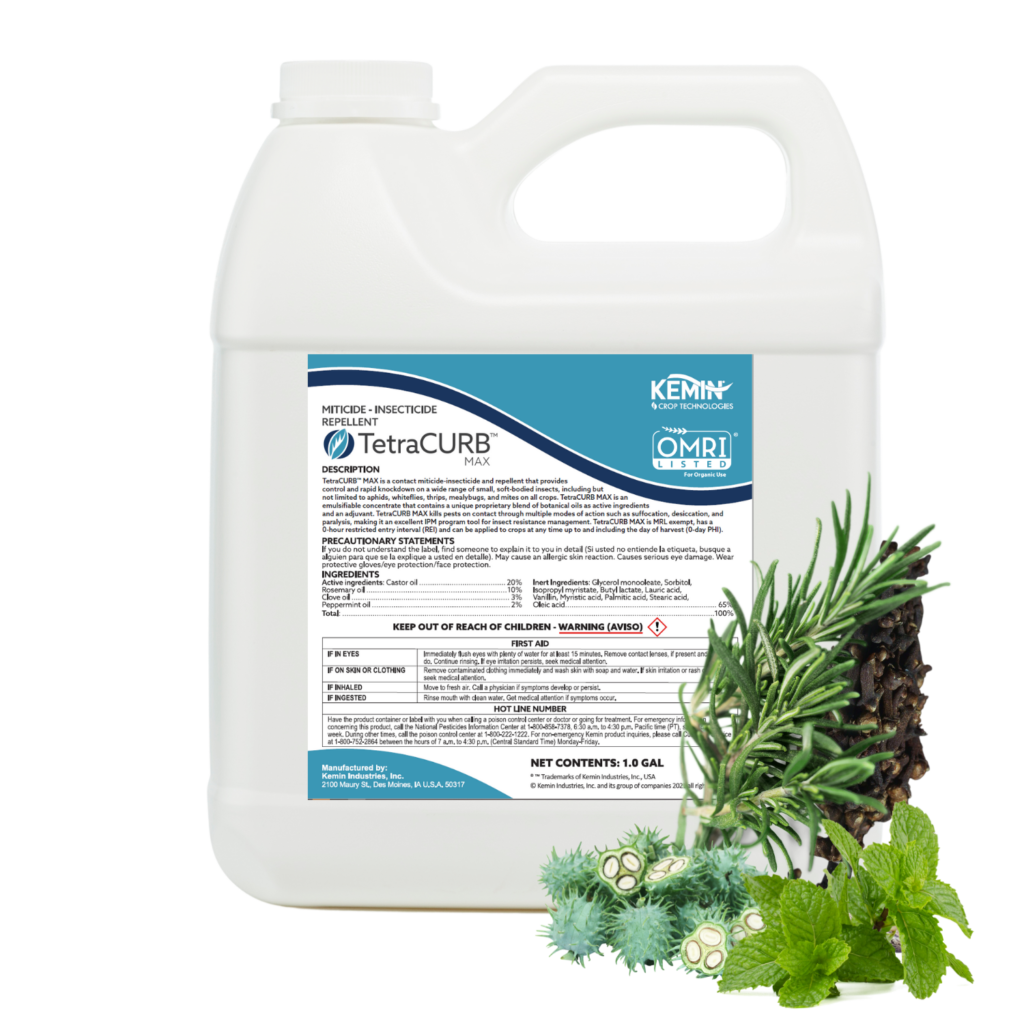Specialty crop growers are always thinking long-term to prepare for upcoming production seasons. Insecticide resistance is a concern all growers have pertaining to specific pests. Will certain chemistries against certain insects continue to be effective years from now? Some farmers are already encountering resistance issues.
Michael Hull, technical services manager at Kemin Crop Technologies, speaks with growers on this subject by discussing their crop’s history. “For example, I’ll ask them what chemistries they’ve used on two-spotted spider mites that have stopped working,” he says. “They’ll call out multiple products and then I ask the question, ‘As a grower, why do you think that happened?’ The manufacturers didn’t change the chemical; the insects most likely have developed resistance to it.”
A PREVENTATIVE APPROACH
One method to counter insecticide resistance is through the use of biological-based products. Kemin Crop Technologies offers botanical oil-based biopesticides that provide multiple modes of action in all specialty crops against certain insects and flexibility in usage. Botanical oils are naturally derived from different plant parts or byproducts of plants like rosemary oil, a natural extraction from a rosemary plant.
“Biologicals are a safer alternative to conventional chemistries,” says Hull. “And they can be as effective as conventional chemistries when used appropriately. A change in how we approach pest control is needed, and the first step is to start from a more preventative approach rather than a reactive one.”
TetraCURB™ MAX, the Kemin Crop Technologies’ flagship product, is a botanical oil-based, contact miticide-insecticide for two-spotted spider mites and soft-bodied insects.
“It reacts with insects in different ways. What that leads to is having multiple pathways for the active ingredients to kill the insect,” explains Hull. “TetraCURB MAX includes chemistries that cause degradation of the waxy cuticle. This dehydrates the insect, allows the rosemary oil to penetrate into the insect faster, and provides a neurological mode of action that causes insect paralysis that leads to death. The product also contains a suffocating agent built into the formulation that blocks the insect’s spiracles, preventing them from breathing. And the product has a repellent effect, controlling larger, mobile insects and forcing them to leave a plant before becoming an issue.”
“We’ve been taught for so long to wait until we reach the economic threshold of what that pest is and apply our conventional chemistries when we reach that threshold,” says Hull. “With biologicals, that threshold becomes much lower, even zero in some cases. So, you’re starting your preventative approach before seeing the insect in the field.”
EXTENDED PROTECTION ADVANTAGES
According to Hull, many growers reach their application limit on conventional chemistries before the end of the season and have nothing left to spray. “If they have a large outbreak, they’ve got nothing to fall back on,” he notes. “With biologicals included in their IPM program, they can keep their pest populations low, so when they do reach the end of the season, they have access to those conventional chemistries in case something goes wrong.”
Hull points out that growers need to realize that biologicals do not have to be used as a substitute for conventional insecticides. They are meant to be used as a supplement to an already established management program. Their presence, however, will allow the reduction of conventional chemistries and less potential for resistance to develop. That will prolong the shelf life of those important conventional insecticides.
“The goal is to increase the number of modes of action present in the field and thereby reduce the likelihood for resistance development,” Hull says.
Since TetraCURB MAX has little to no phytotoxicity, growers can use up to a 2% application rate. “That 2% application would be much more expensive than a .25% application would be, but if you have an outbreak and nothing else in your arsenal, TetraCURB MAX can go all the way up to a 2% application for a true knockdown kill,” concludes Hull.
Visit www.kemin.com/croptech for more information on Kemin Crop Technologies.











